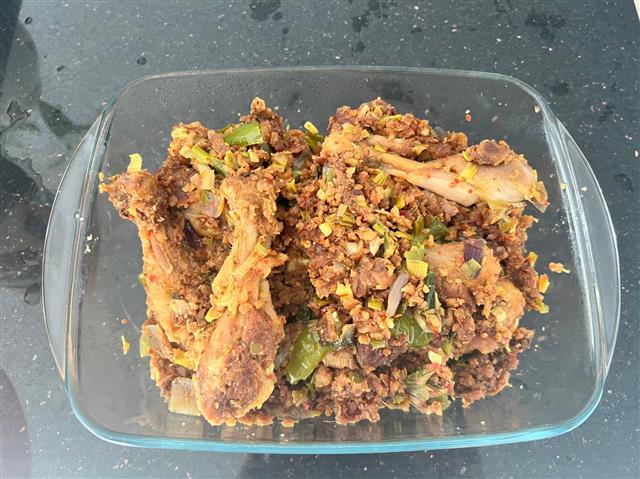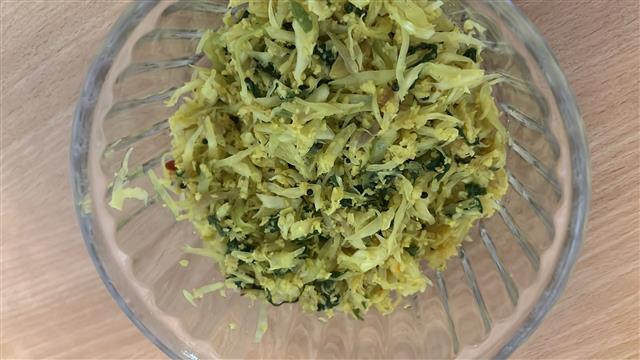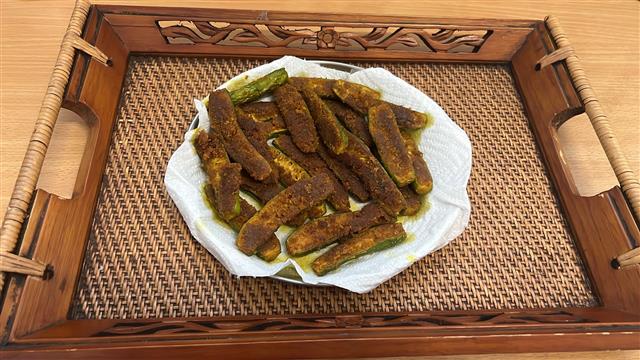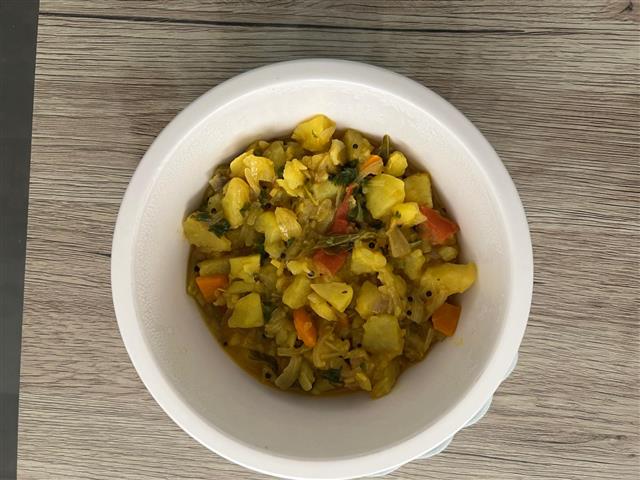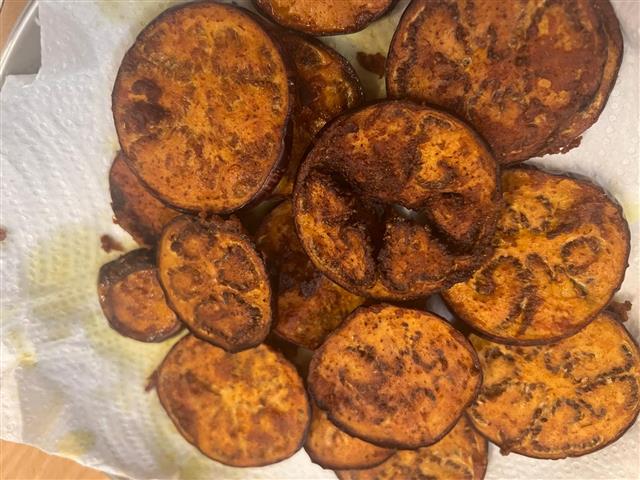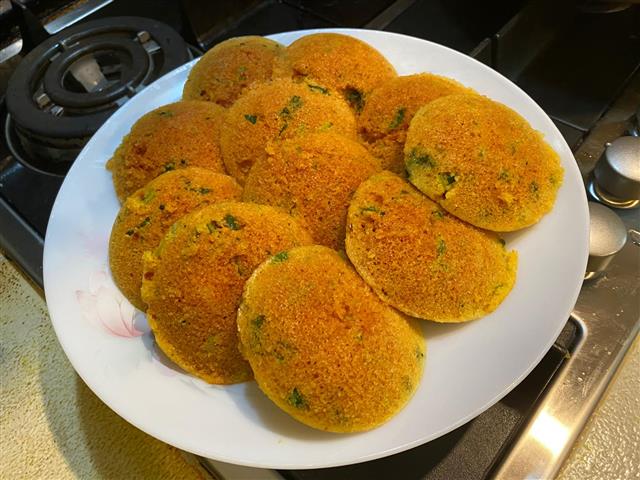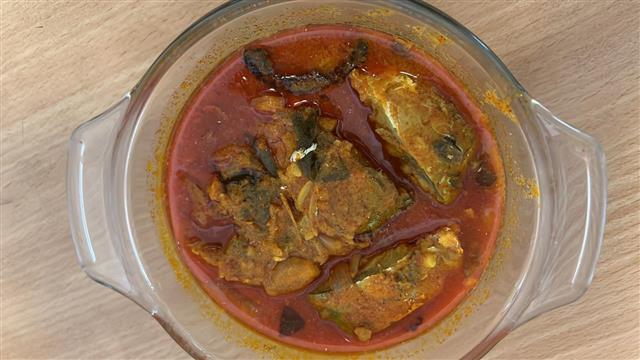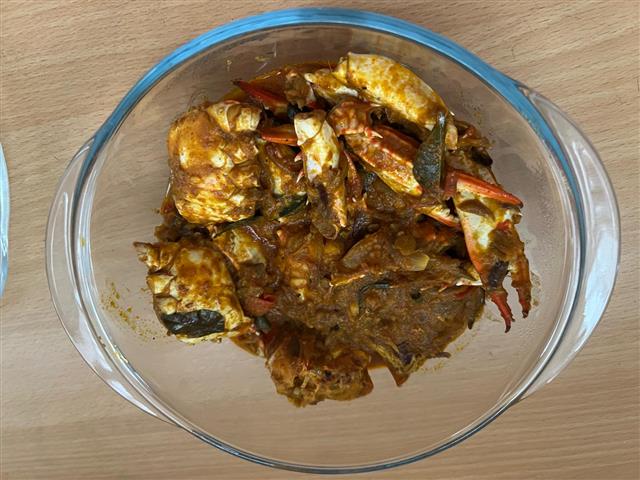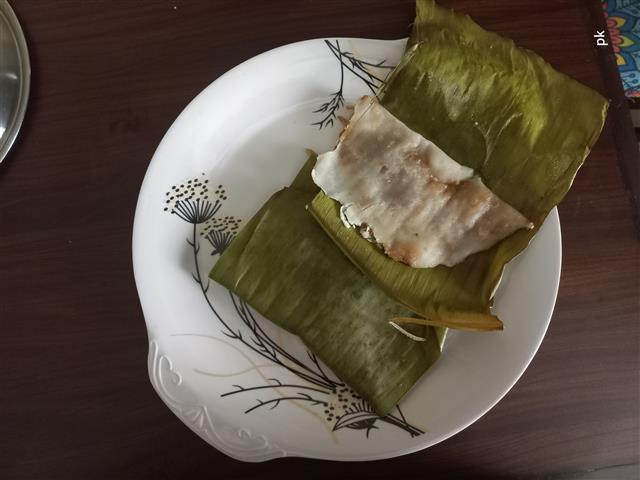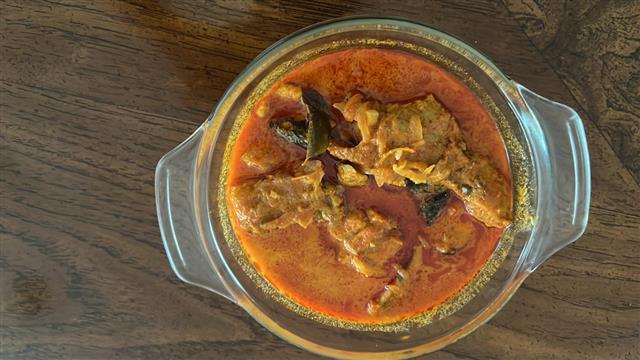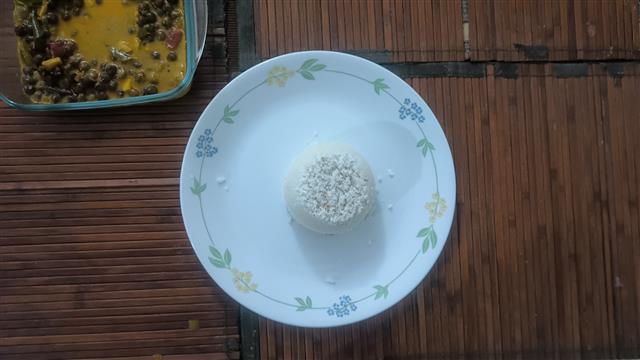
Mutta Roast
(4 reviews)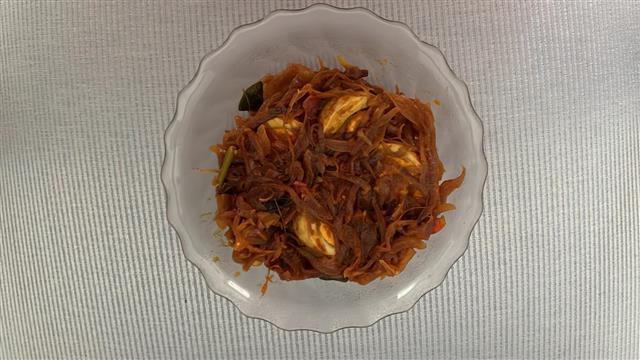
Kerala Mutta Roast is one of those dishes that is versatile. A spiced and creamy egg masala simmered in coconut milk and layered with rich tomato-onion gravy, and peas.
It can be served for breakfast with appam, for lunch with rice, or for dinner alongside chapati. A comforting dish with the right amount of heat and tange, it's made richer by the addition of coconut milk and a base of caramelised onions and tomatoes.
This version adds a subtle twist to the standard Nadan Egg Roast with cooked peas blended into the gravy to create a delicious paste that clings to every piece of egg. This is not a completely dry roast as it's saucy and indulgent.
Ingredients
Directions
- Boil water in a saucepan and add the eggs. Ensure the eggs are submerged and cook for 10 minutes. Cover it with a lid.
- Remove the pan from the flame and set it aside for 10 to 15 minutes. Remove the eggs carefully and place them in cold water for 5 minutes. Peel the skin and set aside the eggs.
- In the meantime, boil the peas in water for 10 minutes. Chop the onions and tomatoes, and mash the ginger.
- Cut the eggs into halves and add in a bowl. Add onions, ginger, and green chilli to a frying pan or kadai with hot oil, and sauté for 2 to 3 minutes.
- Add chilli powder, turmeric powder, meat masala, and tomato and sauté until the tomatoes are cooked.
- Blend the cooled peas in a little water to make a thick paste. Add to the gravy with eggs and mix well.
- Add coconut milk instead of water. Simmer the eggs until they absorb the flavour, on low flame for 5 minutes.
- Garnish with curry or coriander leaves.
Cooking Tips
• Choose the right eggs: Use room-temperature eggs and boil them for 10 to 15 minutes for a firm yolk.
• Slice each boiled egg: Either into half or quarter it to help absorb the masala better.
• Slow cook the onions: Sauté onions low and slow in coconut oil. They should turn golden brown, not burnt.
• Use freshly crushed ginger and green chilli: For the masala base instead of store-bought pastes.
• Always sauté spices on low heat: Do this to avoid burning and to ensure they blend well into the onion-tomato base.
• Add milk at the end and heat gently: keep the flame low to prevent curdling.
How to Serve
• Pair with appam, idiyappam, or puttu for breakfast
• Serve with chapati or parotta for lunch or dinner
• Make a weekend meal with matta rice, thoran, and pappadam
The Story Behind Mutta Roast
Nadan Egg roast, also known as mutta roast, is a beloved Kerala dish often found on both breakfast and lunch tables. It straddles the line between a quick everyday curry and a slow-cooked indulgence.
In my grandmother's home, Sunday breakfasts meant fresh appam straight off the pan, paired with steaming-hot egg roast cooked in a heavy uruli. The masala was never watery, but thick enough to coat the spoon. Sometimes it was made spicier with pepper and crushed garlic, and at other times, it was mellowed with extra coconut milk.
As food habits evolved, people began adding vegetables or making it creamier for children. This version, with green peas ground into a paste, is one such modern twist. It enhances the curry without losing the core of the recipe. To me, this dish is a memory of warmth and simplicity: eggs, onions, a dash of masala, and that unmistakable scent of curry leaves in hot coconut oil.
Kerala-style Mutta Roast is a mildly spiced, coconut-based egg curry. While the word roast often suggests a dry preparation, this version is semi-thick, with a masala gravy made with tomatoes, onions, and creamy coconut milk.
The eggs are boiled separately, chopped, and then gently simmered in the masala just long enough to absorb the flavours. The addition of green peas is uncommon but gives it a richer texture.
Unlike North Indian egg curries that use yogurt, cream, or butter, Kerala-style dish relies on coconut milk and the heat of chillies and black pepper.
My Nadan Mutta Roast can be best described as a dish that bridges traditional cooking and modern comfort food.
Regional Variations of Egg Roast
Across South India, egg roast takes on many forms.
In Tamil Nadu, muttai masala is drier and often uses fennel seeds, curry leaves, and garam masala. The spice blend is heavier, with more chilli and pepper, and the lack of coconut milk.
In Andhra Pradesh, egg curries are spicier, using green chillies, red chilli powder, and minimal tomato. These are cooked in gingelly or sesame oil. The focus is on heat, as in much of Andhra cuisine.
Karnataka's egg gravy version sometimes includes grated coconut roasted with spices. This is ground into a thick paste and stirred into the gravy. It's denser and earthier. The Mangalorean version uses coconut milk just like our egg roast, but with the addition of grated coconut.
North Indian egg curry is pretty much tomato-heavy and finished with cream or kasuri methi. This style is more leaning toward a restaurant-style egg masala.
Kerala's version remains unique for its balance and use of coconut milk. Rich without being heavy, spicy without being fiery, and aromatic thanks to the use of ginger, onions, and curry leaves.
Pro Tips for Perfect Results
→ Add the Peas Paste: Add it to the masala before the eggs to enhance texture.
→ Allow the tomatoes to cook fully until oil starts to separate: This ensures the masala is well-cooked.
→ Don't boil the eggs in the curry for too long: They'll turn rubbery and lose their taste.
→ Use the right masala powder: Meat masala (not garam masala) gives a depth of flavour that complements the creamy coconut milk.
→ Coconut Milk Matters: Use thick coconut milk (not the watery kind) for a creamy finish.
Mutta Roast Variations
Dry Mutta Roast Reduce the coconut milk to half a cup and cook until the masala clings tightly to the eggs. This version is served with porotta or naan.
Pepper Egg Roast Add freshly ground black pepper for heat. Skip coconut milk and garnish with crushed garlic and curry leaves.
Egg Curry with Potatoes Add parboiled potato chunks to the masala before the eggs, making the dish heartier and more filling.
Smoky Roasted Egg Masala Sear boiled eggs in coconut oil with chilli and turmeric powder until a slight char. Then add to the gravy.
Tomato-Free Mutta Roast
Skip tomatoes and use tamarind or vinegar for acidity. Popular among coastal households.
Diet Adaptations
Vegan:
Add tofu or tempeh blocks instead of egg.
Low-fat version
Reduce the amount of coconut milk to half and add water instead.
Storing & Reheating Tips
→ Fridge: Store in an airtight container for up to 2 days.
→ Reheat: Heat on a low flame with a tablespoon of water or diluted coconut milk.
Tip: Reheat only as much as you'll need, as repeated heating affects both flavour and texture of the eggs.
→ Freeze: Not preferred, as the coconut milk and eggs are likely to split or turn grainy on thawing.
Common Mistakes to Avoid
→ Overboiling eggs: This causes a grey ring around the yolk and rubbery whites. Boil just until firm.
→ Curdled coconut milk: Always simmer gently after adding coconut milk. Do not cook on high heat to prevent curdling..
→ Raw-tasting onion masala: Ensure onions and tomatoes are sautéed until golden and soft before adding spices.
→ Too watery: Add coconut milk gradually and simmer uncovered to reach desired consistency.
Frequently Asked Questions
- Can I use frozen green peas?
Yes, but boil them until soft before grinding into a paste.
- Can I skip the peas?
Absolutely. The peas add body but are optional. The dish works well with just eggs and masala.
- Is this dish spicy?
Moderately spicy. You can increase or decrease chilli depending on your preference. The coconut milk balances the heat.
- Can I make it fully dry?
Yes. Simply cook down the masala further and reduce or skip the coconut milk.
- Can I add garam masala instead of meat masala?
Meat masala is preferred in Kerala, but a good-quality garam masala works well too.
Equipment Needed
→ Heavy-bottomed pan or kadai
→ Saucepan to boil the eggs
→ Lid for the pan
→ Mixer grinder to make the pea paste
→ Slotted spoon to remove the eggs without breaking
→ Wooden or silicon spatula
